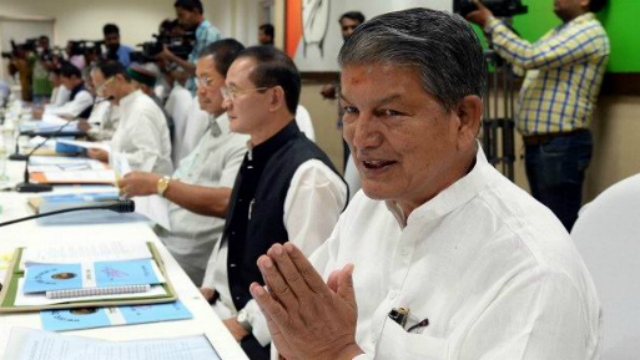Uttarakhand Crisis: A look into the state’s goings-on
Uttarakhand was a case of a State Government run under blatant ignorance of Constitutional Provisions. 9 MLAs had already rebelled from the Congress Party and the Government had fallen short of a majority whereas the Speaker had already murdered Parliamentary Democracy, which is a basic and core feature of the Constitution of India by declaring a budget rejected by majority of the MLAs as passed. Uttarakhand thus, became a State with a flawed budget a blatant ignorance of a major Constitutional Provision which according to the Centre is the main reason behind the imposition of President’s Rule.
The grand old party, which over the last several decades has time and again murdered democracy, Federalism and has tamed the Judiciary successfully to get over all the aforementioned scene has been making a issue out of this valid proclamation of State Emergency. Before the real murderers of democracy somehow manipulate and misrepresent the facts and in order to lead you into believing what is a sound proclamation as unconstitutional, we provide you with reasons as to why the proclamation was not bad in law and in fact in consonance with the Constitution of India:
Uttarakhand Crisis: Satisfaction envisaged under Article 356 is subjective
Article 356 of the Constitution governs the imposition of President’s rule in our country. According to this Article the President can impose emergency in a State if he is satisfied either by himself or on the receipt of Governor’s report, which is the case with Uttarakhand that there was a breakdown in the State machinery and it can no longer be carried out in accordance with the provisions of the Constitution. The satisfaction envisaged under the aforementioned Article is definitely subjective and the apex court has held this several times that the reasons behind President’s satisfaction cannot be enquired into and not at all within the Judiciary’s domain, all the Judiciary can do is to enquire whether the proclamation was made in a mala fide manner or whether the same was erroneous. Once the Court is satisfied that no such mala fide exercise was there, the imposition is deemed proper. In the case of Uttarakhand the proclamation is neither mala fide nor extraneous as the same has been made at a time when the State Government does not enjoy the support of requisite majority of the Legislative members and a proper budget for the State has not been passed. It constitutes a grave ignorance of the provisions of Constitution and a situation perfect for the invocation of President’s rule.
Uttarakhand Crisis: Constitution of India is quasi federal and not purely federal
The Pseudo Seculars and the Presstitutes have invoked Federalism to dispute or to altogether declare Uttarakhand Crisis as unconstitutional the invocation of President’s rule by the Centre. This is a deliberate attempt to mislead the masses as the fact remains that we are in fact not a pure Federation but a quasi federal State where the Centre is more powerful than the constituent States. In fact, Article 356 is a provision that makes it incumbent upon the Centre to overlook the functioning of the States and to determine whether the Government is functioning in accordance with the provisions of the Constitution or not. It was held in State of Karnataka v Union of India that the kind of federation established in India has a strong unitary bias with power given to the Central Government of supervision in certain circumstances of State Government. It cannot be said that the Centre cannot take any action which results in interference with the Governmental Functions of the State. This explains in clear terms that the kind of federal scheme our Constitution establishes is not a pure one where the Centre may not at all interfere with the working of the States as the Pseudo Seculars may want us to believe.
Conclusion:
Declaring anything and everything as unconstitutional is the most common defence of those who do not have any other defence in our political spectrum. This also explains the kind of ignorance that we as our citizens have towards our Constitution, the basic law of the land and how easy it is for certain elements within the political spectrum to derail the political discourse and lead us into believing their make believe and belied claims. Constitution is not only about Fundamental Rights and the liability of the States but defines and works out the whole governance scheme which the masses ought to be at least aware of if not conversant with it. The tragedy is that even after 6 decades of its operation the masses are usually unaware of some of the most basic provisions, the most immediate consequence being that an Owaisi gets through after citing Constitution as a reason for not chanting ‘Bharat Mata ki Jai’ and a Harish Rawat gets a chance of making a mountain out of a molehill that Uttarakhand Crisis is.
